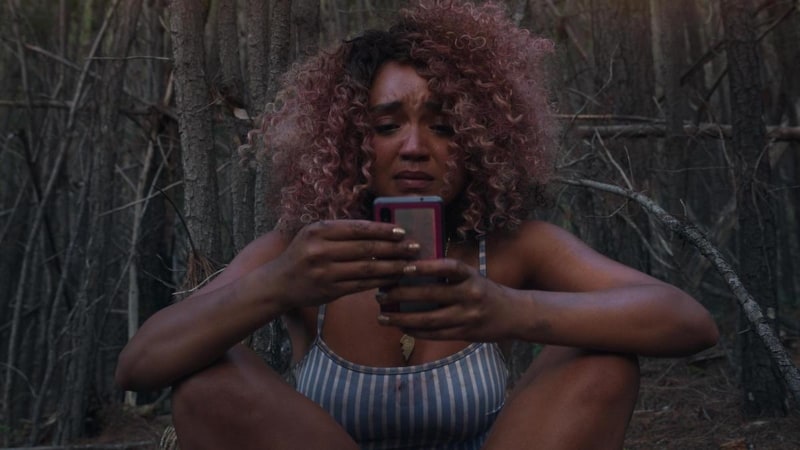
The 26th edition of the Fantasia International Film Festival runs July 14th through August 3rd, and you can follow all of our coverage here.
Nobody likes social influencers. Sure, they have the followers to suggest otherwise, but social media is home to the lies we tell ourselves and others. Influencers exploit that in the name sponsorships, product sales, and online popularity. Nobody actually likes influencers, including, it turns out, influencers themselves. Sissy isn’t the first genre effort to pair online personas and app-likes with murder and mayhem — Tragedy Girls (2017) does it extremely well, Spree (2020) and Superhost (2021) do it also — but this new Australian horror/comedy goes hard condemning those on both sides of the screen with mixed results.
Cecilia (Aisha Dee), known to her hundreds of thousands of online followers as @SincerelyCecilia, is all about validation and affirmation. She shares tips with viewers on how to calm down, focus your energy, and live a healthy life both physically and mentally to be your best self. Of course, she’s a bit less well put-together offscreen with a lot to be desired when it comes to social skills. An unplanned run-in with her old friend Emma (Hannah Barlow, who also co-writes/co-directs) almost tips her over the edge, but a spontaneous invite to Hannah’s bachelorette weekend leaves Cecilia more excited than stressed. The two were best friends as kids until a girl named Alex and violent incident split them apart. But hey, it’s been ten years, what could go wro–oh, a still physically scarred Alex (Emily De Margheriti) is hosting the weekend at her family’s remote summer home? Time to bust out the relaxation candles.
Sissy pulls no punches when it comes to its razor-sharp critique of influencer culture, and its disdain spreads to the kind of viewers who soak up manufactured realities of all kinds. We don’t meet any of Cecilia’s followers, but Emma and her friends are shown engorging themselves on trashy reality television and hurtful gossip to the point that it’s difficult to see them as victims. That becomes one of the film’s issues, though, as with one minor exception there’s no one here to root for or celebrate — even if the film itself encourages audiences to cheer on the killer.
Cecilia, or Sissy as she was known as a kid, is a severely mentally ill young woman who spirals hard and fast over the course of the weekend leading to both desperate runs to social media for praise and real-world bloodletting. Even before then, though, she’s having regular breakdowns and seeing bloody visions in the dark. There’s an effort made to paint her as a victim of bullying, a serious offense that’s led to the creation of numerous slasher killers, but writers/directors Barlow & Kane Senes can’t resist making her the anti-hero of the film. She’s goofy and wants so badly to be accepted, and you can’t help but feel for her situation early on, but she quickly reveals herself to be real trouble and a true villain. That makes for an oddly unappealing lesson as the film is basically suggesting that you’re absolutely right to single out and avoid the weird kid at school or the strange person at work — sometimes they’re the most interesting people and often in need of friends!
Speaking of which, the friends are all painted so bitchily that their subsequent murders leave viewers unfazed, although some will no doubt be smiling at Cecilia’s antics. (I’ll admit a grin graced my own lips at a certain head pop.) But what to make of Emma? She’s the only character in Sissy who’s remotely human and likable, the only one innocent of offense — yes, it was a poor choice bringing Cecilia and Alex together again, but her anger at her friends for being mean towards Cecilia feels genuine. Emma feels like a lynchpin character that could have triggered some interesting conversations in contrast to the rest, but the film does nothing with her.
The bright side to Sissy‘s love for its main character is Dee’s terrifically charismatic performance. She’s mildly appealing as she spouts self-help nonsense, but she comes alive in the scenes where she’s actually trying to socialize and be sincerely friendly. Later scenes where she crumbles emotionally hit thanks to an emotional turn, and while the tone doesn’t necessarily land you’ll still appreciate her chops. Barlow’s Emma is also a good turn, but the remaining characters are often played a bit too broad to be either appealing or impressive.
The film’s visuals pop at times with social media-infused stylizations, and the score finds an equally playful tone — but good gravy will you want to punch its incessant presence right in the dick. Composer Kenneth Lampl finds some bright beats, but it’s overused to the point of obnoxiousness. The idea is presumably to keep apace with Cecilia’s mental world, but it prevents some scenes from breathing the way the need to. Still, it looks good, and Barlow/Senes keep the film’s energy up for the bulk of its slightly overlong running time.
Sissy manages some engaging condemnation of our social media-fueled culture and entertains with some of its kills, but its themes and observations leave a lot to be desired. Cecilia is a bad person — unwell and bullied, but also homicidal and delusional. The film doesn’t seem as convinced, though, leaving her an antihero we’re meant to like, follow, and retweet.
Related Topics: Fantasia Film Festival, Sissy
